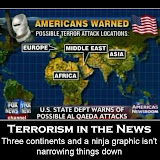The Good: Outgoing #2 officer in Iraq, Lt. Gen. Odierno, talks with Michael Gordon of the New York Times about the future of Iraq. He recommends more job creation, which isn't sounding like a bad idea, since unemployment fuels the insurgency. More dead terrorists up by Tal Afar. Ninawa province in northern Iraq is currently hosting the brunt of Al-Qaeda activity, and small victories like these will aid in preventing future violence in Iraq.
The Bad: 5 civilians killed in Diyala province by an IED. The Pope himself has called for the release of Chaldean archbishop Rahho as he was abducted after thugs murdered his bodyguards earlier this week in Mosul. Oh yeah, electricity for Baghdad's citizens still sucks. The services we take for granted back in the states (trash collection, electricity, clean water) are still in major disrepair in Iraq thanks to Saddam, UN Sanctions, and sabotage by the insurgency. This does not bode well for economic development, which will encourage more poverty-stricken Iraqis to join gangs, racketeering operations, terrorist proxies, etc.
The Ugly: Iraqi-Iranian relations are important to boosting economic/political development in the region. But crazy Ahmadinejad has used his visit to Baghdad to, predictably, take pot shots at the "Great Satan", despite the fact that the coalition took out two of Iran's greatest enemies (Taliban and Saddam). And some of the lefty blogs have bought into this propaganda hook, line, and stinker. Many of Iraq's Sunnis were not happy with the Iranian President's visit and openly protested in the streets of Fallujah and Kirkuk.
03 March 2008
Iraq News (3 Mar)
Ahmadinejad smug in his accusations
Labels:
The Good Bad Ugly News of Iraq
Subscribe to:
Post Comments (Atom)










 See what the others have said:
See what the others have said:
2 comments:
I've been reading a considerable amount about the electrical issues in Iraq. Production of Megawatts continues to rise, but it cannot meet the demands of the population.
Infrastructure such as electrical lines, switches and transformers is as much a problem as any lack with developing electrical plants.
Another issue, as you note, is age and condition of the electrical plants, who and what pays for it. The Iraqi government has a number of tenders out for existing and new electrical plants. What they are trying to do is move towards privatizing electricity. Right now, as you may know, Iraqis don't actually pay for electricity. In some respects, that has not fostered any particular conservation that would naturally come from people who have to pay for their usage. A problem is that, under current conditions, Iraqis don't have any compunction not to scam electricity from existing lines through ad hoc wiring. There is no concept of "crime" in this because it is technically free, but the ad hoc wiring is often insufficient and down right dangerous. The wiring actually drains electricity from these lines that is never used at the end due to the poor condition of the wiring. It's also extremely dangerous. It would be interesting to see any statistics on electrical shock injuries or deaths.
The question may be, not just how more electricity is going to be supplied, but in how it is going to be provided to the end users, who is going to control it and whether Iraqis will abide by any rule that ultimately allows for better availability over all.
Kat,
Sharp analysis. There is a "black market" for electricity in Iraq which has been controlled by the militias, and Iraqis have to pay to jack into seperate generators that are off the grid. The electricity situation in Iraq was never good as Saddam thought it was more important to start a feudal war with Iran and then Kuwait than to actually build up infrastructure. One of the big problems on the supply side is getting oil via the pipelines to the power plants to run the generators. The Ministry of Electricity and Ministry of Oil are constantly haggling over this, much to the disservice of the Iraqi people. Electrical infrastructure needs to be seriously overhauled, and foreign and domestic investment now has a chance to really take form with the improved security situation.
Post a Comment